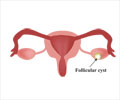Q: Which doctor treats dyspareunia?
A: Dyspareunia is treated by a gynecologist in females and a urologist in males.
Q: Can dyspareunia cause infertility?
A: Dyspareunia per se does not cause infertility. The patient may avoid sex to prevent the pain thereby resulting in infertility. Some causes of dyspareunia like endometriosis are also associated with infertility.
Q: Can dyspareunia be caused by drugs?
A: Drugs such as anti-histamines prescribed for allergies or tamoxifen used in breast cancer patients can cause vaginal dryness and painful sexual intercourse.
Q: How long will it take to improve or get cured?
A: The time it takes to get better depends on the cause. If it is caused by simple vaginal dryness, a lubricant cream will resolve the condition within a day or two. Dryness due to atrophic vaginitis will improve by placing an estrogen cream in the vagina. Dyspareunia due to vaginal yeast infections or a urinary infection will improve once the infection is controlled. Psychological causes may take longer and may need longterm counseling.
Q: Can dyspareunia be prevented?
A: Infectious causes of dyspareunia can be prevented by maintaining a good genital hygiene, keeping the area dry, changing moist underwear and washing the genital area after urination and intercourse.
Practise safe sex to reduce risk of sexually transmitted diseases.
If you have endometriosis, it is advisable to have intercourse in the immediate period after menstruation when the pain is usually less severe.
Q: What is vaginal stenosis?
A: Narrowing of the vaginal passage and loss of resilience is termed vaginal stenosis. It may occur due to thickening of the vaginal wall following radiotherapy or genital surgery for cancer.
Q: Will I need surgery for longstanding dyspareunia?
A: Not all causes of dyspareunia require surgery. In severe endometriosis, laparoscopic surgery may be used to remove endometrial tissue buildup in various sites such as pelvis, fallopian tubes or vagina.








